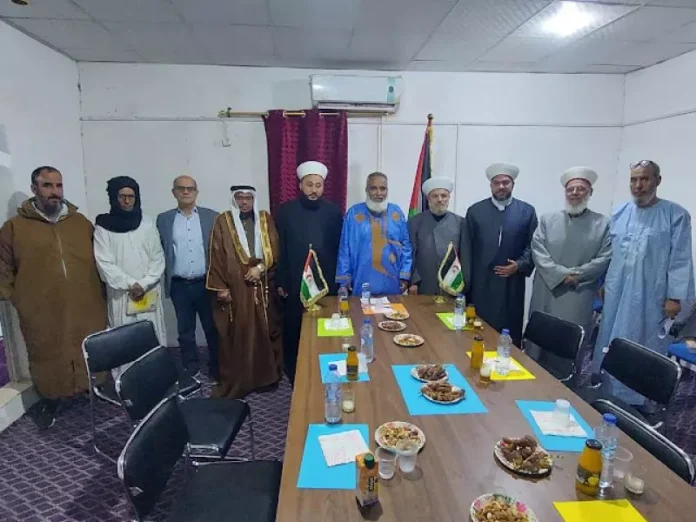The recent visit of a Lebanese-Syrian religious delegation closely affiliated with Hezbollah to the Polisario-run camps in Tindouf is far from an ordinary spiritual encounter. It reflects a deeper strategic alignment between the separatist movement and Iran’s multi-layered influence networks seeking to extend their reach across Northwest Africa.
Images shared by the Polisario’s media outlet attempted to portray the event as a cultural-religious gathering. However, the identity of the guests — including Sheikh Hussam Al Ali, Moussa Al Khalaf, Salem Dabboussi, Mohammad Al Rafei, and Hadid Khalaf Al Darwish — makes it clear that this visit carries heavy geopolitical significance.
Beyond Symbolic Diplomacy: An Ideological and Strategic Alignment
These figures belong to the cultural and confessional circles that gravitate around the Tehran–Hezbollah axis.
Their presence in Tindouf is therefore not merely ceremonial. It signals:
-
the Polisario’s willingness to integrate into a broader transnational network;
-
and Iran’s interest in projecting influence into the Maghreb and the Sahel through new proxies.
American intelligence and research institutions have closed the debate
Reports issued in recent months by prominent U.S. think tanks — notably the Foundation for Defense of Democracies (FDD) — have reinforced the credibility of long-standing accusations:
-
religious and military channels linking Iran and the Polisario ;
-
training of Polisario fighters by Hezbollah in Syria ;
-
the detention of hundreds of Polisario members during the Syrian conflict ;
-
explicit statements from a Polisario representative in 2022 about Iran supplying armed drones, later corroborated by Morocco’s UN mission ;
-
verifiable connections with extremist groups in the Sahel, including the trajectory of Adnan Abu Walid Al-Sahraoui, who moved from Polisario ranks to leading ISIS in the region.
These elements show an emerging architecture combining separatism, radicalization, and proxy warfare.
Algeria’s strategic ambiguity is becoming harder to justify
Algeria continues to declare that it maintains distance from Iran’s ideological agenda.
Yet it provides safe haven to a movement whose ties with Tehran and Hezbollah are increasingly documented.
This contradiction exposes a structural ambiguity in Algeria’s regional posture and reduces its diplomatic credibility, especially as these developments occur on its own soil.
A growing debate in Washington: Should the Polisario be listed as a foreign terrorist organization?
The visit unfolds at a time when the U.S. Congress is examining a bipartisan bill introduced by Joe Wilson and Jimmy Panetta, calling for the designation of the Polisario Front as a Foreign Terrorist Organization (FTO).
Supporting documents underline:
-
the movement’s alignment with Iran and Hezbollah ;
-
its intersections with jihadist actors in the Sahel ;
-
and the rocket attacks recorded near the Algerian border during the 2024 Green March anniversary.
Conclusion: The Polisario is no longer a mere separatist movement
This episode confirms that:
-
the Polisario has evolved beyond its original separatist narrative ;
-
it now functions as a component of a wider geopolitical matrix shaped by Iran’s regional ambitions ;
-
and the argument for labeling it a terrorist organization is gaining traction in U.S. strategic circles, connecting North African security with Washington’s broader regional interests.




